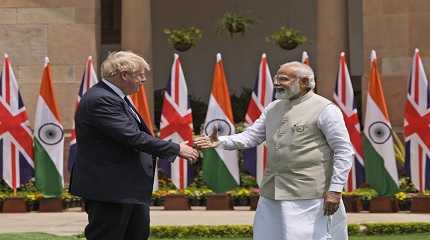
NEW DELHI (AP) — India and Britain on Friday called on Russia for an immediate cease-fire in Ukraine as British Prime Minister Boris Johnson announced steps to help move New Delhi away from its dependence on Russia by expanding economic and defense ties.
Indian Prime Minister Narendra Modi told reporters that he and Johnson discussed the situation in Ukraine, underscoring the importance of diplomacy and dialogue to settle issues.
“Both sides also called for a free, open, inclusive and rule-based order in the Indo-Pacific,″ Modi said in an apparent reference to China’s increasing assertiveness in the region.
Johnson did not pressure Modi to take a tougher stand against Russia over its invasion of Ukraine, said Harsh Shringla, India’s foreign secretary.
Johnson told reporters that India had come out strongly against the killings in Bucha earlier this month.
The British prime minister also said “he (Modi) has already intervened several times with Vladimir Putin to ask him what on Earth he is doing and where it is going.”
Johnson said the two countries will try to conclude a free trade deal by October that is expected to double their current $50 billion bilateral trade by 2030.
“There are some difficult issues — like a tariff on whisky is a tough one. It would be great if we could fix that. But there are big opportunities, we can get it done. I’m optimistic,” he said.
Johnson switched over to the Hindi language to describe Modi as a “Khaas Dost,” or special friend, and said, “Our relations have never been as strong or as good between us as they are now,”
Johnson said Britain will issue an open general export license to India, reducing bureaucracy and shortening delivery times for defense procurement.
“This is our first OGEL in the Indo-Pacific region,” he said.
Johnson also announced $1.29 billion in new investments and export deals in areas from software engineering and artificial intelligence to health, creating almost 11,000 jobs across the United Kingdom.
India welcomed Britain’s commitment to invest $1 billion in climate-related projects in India between 2022 and 2026, according to a joint statement issued after the talks between the leaders.
The two countries also agreed to collaborate on the manufacturing of defense equipment, systems, spare parts and components under the “Make in India” program through a transfer of technology and setting up of joint ventures.
“They noted cooperation in key areas of strategic collaboration, including modern fighter aircraft and jet engine advanced core technology,” it said.
The two countries are also committing up to $96.8 million to roll out adaptable clean tech innovations from India to the wider Indo-Pacific and Africa, and working together on international development and girls’ education, a British High Commission statement said.
Soon after his arrival in India on Thursday, Johnson said he was aware of the close ties that India and Russia have shared.
“We have to reflect that reality. But clearly, I’ll be talking about it to Narendra Modi,” he told reporters in Ahmedabad, the capital of western Gujarat state, where he landed.
Modi recently called the situation in Ukraine “very worrying” and has appealed to both sides for peace. While India has condemned the killings of civilians in Ukraine, it has so far not criticized Putin, and abstained when the U.N. General Assembly voted this month to suspend Russia from the Human Rights Council.
Modi has also responded coolly to pressure from U.S. President Joe Biden and others to curb imports of Russian oil in response to the invasion.
Johnson said Friday that “the world faces growing threats from autocratic states which seek to undermine democracy, choke off free and fair trade and trample on sovereignty.”
“Our collaboration on the issues that matter to both our countries, from climate change to energy security and defense, is of vital importance as we look to the future,″ he said.
The British High Commission statement said Britain is offering next-generation defense and security collaboration across five domains — land, sea, air, space and cyber — to face complex new threats.
Britain will also seek to support India’s requirements for new technology to identify and respond to threats in the Indian Ocean, the statement said.
Johnson said he and Modi also discussed new cooperation on clean and renewable energy, aimed at supporting India’s energy transition away from imported oil and increasing its resilience through secure and sustainable energy.
India receives relatively little of its oil from Russia, but ramped up purchases recently because of discounted prices. India is a major buyer of Russian weapons, and recently purchased advanced Russian air defense systems.




